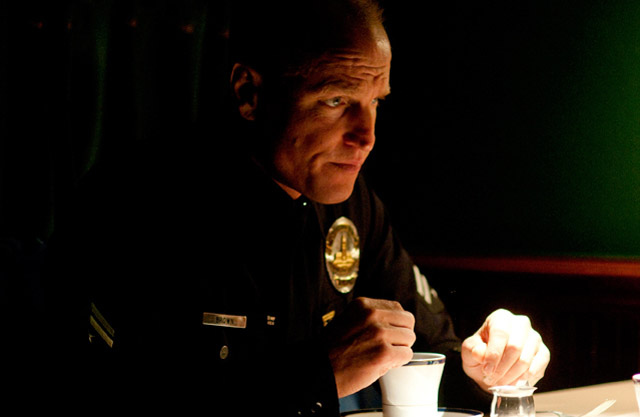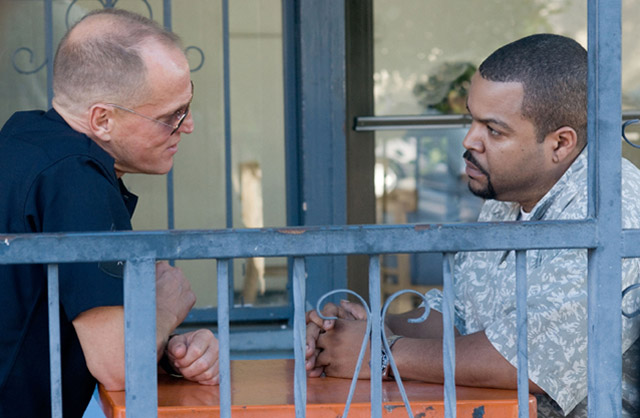CHICAGO – In anticipation of the scariest week of the year, HollywoodChicago.com launches its 2024 Movie Gifts series, which will suggest DVDs and collections for holiday giving.
Sirens Flash Red For Woody Harrelson in ‘Rampart’
 Rating: 3.5/5.0 |
CHICAGO – The “thin blue line” is a police term. It represents the designation between the protection the police provides and the anarchy that is on the other side of that protection. The cop that Woody Harrelson portrays in “Rampart” crosses that line repeatably, formulating his own retribution.
Set in 1999, within the cesspool of a corrupt Los Angeles police department (”Rampart” refers to a cop district near downtown L.A.), the film represents overall corruption through Harrelson’s character – a profligate boozer, womanizer and anger addict. Harrelson’s portrayal embraces the entire sad system of broken law enforcement, in which longtime street cops become as amoral as the criminals they are trying to corral. Harrelson is another “bad lieutenant,” both a victim of his mental breakdown on the streets and the prime cause of it.
It is the late 1990s, and the Rampart division in Los Angeles is suffering through a cause-and-effect scandal within their ranks. Officer David Brown (Woody Harrelson) comments on the ensuing investigation, while at the same time showing signs of his own desperation on the job. He deals with a home life that includes two ex-wives, who are sisters (Cynthia Nixon, Anne Heche), and a daughter from each of those marriages. He is unsteady in his approach to everything, drowning his emotions in booze and one night stands.
 Photo credit: Millennium Entertainment |
A crisis develops when his patrol car is struck at an intersection. The driver of the other car seemingly attacks Officer Brown, but the only evidence of the encounter is a video of Brown beating the driver nearly to death. He is now involved in a Rodney King-like situation, where the prosecutor (Steve Buscemi) and the defense attorney (Sigourney Weaver) both are out to get him. His only insider becomes a retired cop name Hartshorn (Ned Beatty), and he leads him on a path to another means of destruction. With an internal investigator named Timkins (Ice Cube) on his tail, and a dysfunctional coupling with a shady lawyer (Robin Wright), everything this cop once trusted to save him is now unaccessible.
Using the real Rampart scandal as the embodiment of Harrelson’s portrayal was an intriguing metaphor. Human motivations of greed, lust and authoritarian power course through Officer Brown’s being, and the weaker his position becomes the more he relies on those corrupting influences. Often scandals are merely a house of cards, taking one component from a key area collapses the whole structure. It is not only Officer Brown that is reeling, it is the entire system.
Los Angeles is a major character used very effectively. The vast reaches of its urban wasteland are caustically on display, from the horrible food hangouts of the cops to the claustrophobic neighborhoods. Officer Brown creeps around the numbing atmosphere, seemingly looking for any inspiration to his tattered soul. The aimless boulevards and the constant parade of mindless storefronts is enough to bring anyone to the knees of salvation, much less those called upon to serve and protect.
Harrelson gives it his all, but sometimes the script wasn’t there for him. It asked him to turn on a dime, and he fell so fast into a corrupt pit that it felt like he couldn’t keep up. There is a nice shot of him cleansing in a L.A. swimming pool, followed by a histrionic rant in the rain that didn’t jibe with the situation. I liked Harrelson’s performance for the guts it required, but there was a one note quality to it. Some mechanical subtleties would have helped, and he was best when communicating the character in silence, as in the stark conclusion.
 Photo credit: Millennium Entertainment |
The director and co-screenwriter, Oren Moverman, took great care in keeping up with the fraying threads of our established protection system. When it comes down to shadowy figures like Ice Cube’s internal affairs representative, or Ned Beatty’s sad retiree, no wonder the rest of the legal system operates like their hands are firmly tied. Officer Brown’s unusual family was also emblematic, with more reasons to be apart than together, the adults selfishly breaking down in front of the children. This is harsh territory, but cynically seems closer to the truth as how flesh reacts near flame.
Modern drama, especially in movies and television, owe dues to police officers. In these art forms, they are displayed as saviors, heroes, victims and finally, corrupted souls. In “Rampart,” they are asked as protectors to represent all of us against a crumbling social system, fading in front and in back of the thin blue line.
 | By PATRICK McDONALD |


